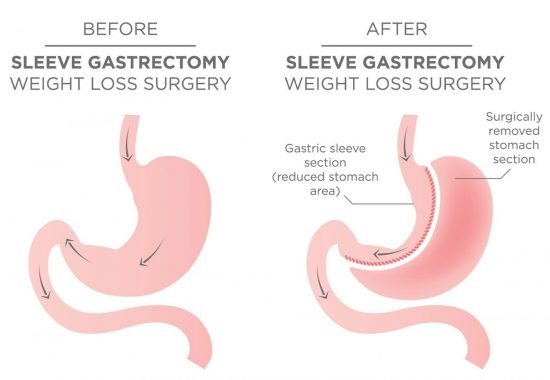Gastric Sleeve Surgery

What is Gastric Sleeve?
Gastric Sleeve Surgery, also called sleeve gastrectomy or vertical sleeve gastrectomy is a type of weight loss surgery, also called bariatric surgery. Weight loss surgery is intended for patients who are obese, or severely overweight, not for those who only need to lose a little weight. During gastric sleeve surgery, a portion of the stomach is removed to reduce appetite and prevent over-consumption of calories. This anatomical alteration is permanent.
Gastric Sleeve Surgery is the most commonly used method in the treatment of obesity. The operation allows the stomach to take the shape of a tubular tube extending through the small curvature. The average volüme of the stomach is about 150 – 200 cc. During this operation, a rate of 65% -90% is removed depending on the width of the stomach.
There are 2 weight loss mechanisms in this surgery; restrictive and hormonal effect. Feeling of satiety with little food after vertically collapsing the stomach is a restrictive effect. The hormonal effect is the loss of appetite with reduced release of the ghrelin hormone produced by the cells in the fundus, which is the upper part of the stomach.
This part is the section that mainly provides the hunger hormone “ghrelin” and diabetic hormones. After the operation, patients lose 65-70% of their excess weight in approximately 12 months. The patient can increase this rate of weight loss by up to 100% through exercise or other supportive factors.

One of the greatest advantages of operation of the tube gastric (sleeve gastrectomy) is that there is no problem in the intake of vitamins and minerals since there is no operation that affects the absorption.
Patients only receive temporary supports such as iron during certain periods (first fluid feeding period). As with all obesity surgeons, nutrition gradually changes in this procedure and should be accompanied by a nutritional counselor during adaptation. Following tube stomach operation, 20% of back weight gain can occur in patients with adaptation disorders in the nutritional form being the biggest factor.
Sleeve stomach (sleeve, diabetes, high blood pressure, sleep apnea, fatty liver, joint pain, regression, and recovery in obesity-related conditions such as high cholesterol and triglyceride.
After this surgery, regression, and recovery are achieved in obesity-related diseases such as diabetes, high blood pressure, sleep apnea, fatty liver, joint pain, high cholesterol, and triglyceride levels.
Gastric Sleeve Procedure
Description
Removes part of the stomach and creates a new, tube-shaped stomach or “sleeve”.
Surgery Time
On average, the gastric sleeve surgery lasts from one hour and 15 minutes to one hour and a half.
Hospital Stay
Two to Five days. Please contact for more details and accommodation information.
Recovery Time
Two to four weeks. Since the gastric sleeve surgery is done laparoscopically, recovery time is much shorter. Depending on the type of job you have, you will be able to return to work in as soon as one or two weeks (desk job) or two to four weeks (if your job requires certain physical activities).
You will have a restriction of not lifting more than 10 pounds for the first three weeks after the surgery, then weight can be increased to 25 pounds for another three weeks, and after that, you will be able to increase weight lifting to normal.
How you lose weight?
The procedure reduces the size of the stomach and restricts the amount of food you can eat at one time, helping you feel full sooner; it also removes the part of the stomach that produces Ghrelin, which is a hormone that stimulates appetite. Studies show that in many cases this helps to noticeably reduce without completely eliminating a person`s appetite.
Weight loss after gastric sleeve surgery is slower than with gastric bypass and differs in every individual case. On average, one should expect to lose at least half or a major part of excess body weight within the first year after the surgery. Success is higher for people who are realistic about how much weight will be lost, keep appointments with the medical team, follow the recommended eating plan, and are physically active.

Nutrition After Gastrectomy Surgery
In most cases gastric sleeve surgery, the patient stays in the hospital for 3 days. The patient will need 2 weeks off of the work and require help with family at least one week. Full recovery of this surgery requires typically 6 weeks. You need proper follow your surgeons advised before and after surgery especially diet & physical exercises.
- The drinking water is started in the 6th hour after the operation.
- Liquid foods are consumed between 1 and 15 days.
- Soft puree is consumed for 16 to 30 days.
- Solid food feeding starts after the 1st month.

Risks of the Gastric Sleeve Surgery
Most cases patients do not produce complications after a gastric sleeve surgery.The potential risk of any weight loss surgical procedure, like Gastric Sleeve Surgery-
- Damage to adjacent organs such as stomach and intestines throughout the surgery.
- Leakage of digestive contents of the staple line that can commence to serious infection.
- Gastritis, heartburn or stomach ulcers may occur.
- Vomiting of eating heavier than your stomach pouch can keep.
- Gastroesophageal reflux disease (GERD)
- Vitamin and mineral deficiency
